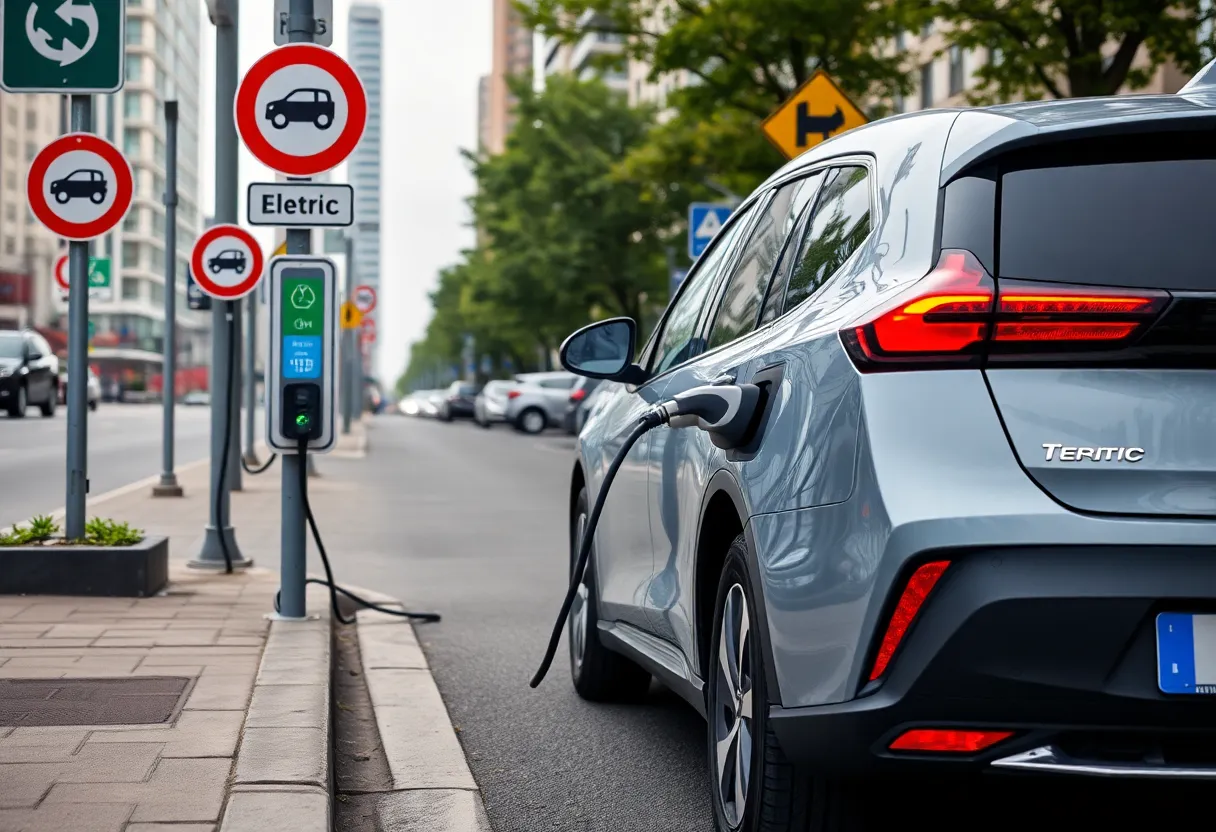Omaha, October 17, 2025
Omaha’s rapid adoption of electric vehicles (EVs) is challenging Nebraska’s state funding, leading to a reported $5 million shortfall in gas tax revenues. This decline affects budget allocations for essential infrastructure projects. Local lawmakers are considering EV road fees and hybrid funding models to stabilize resources while promoting sustainable vehicular options.
Electric Vehicle Surge in Omaha Impacts State Revenues
In Omaha, the rapid rise in electric vehicle (EV) adoption is creating challenges for state infrastructure funding. State officials have highlighted a drop in gas tax revenues due to fewer vehicles relying on gasoline, which is affecting budgets for road maintenance and other projects.
The most pressing issue is the financial shortfall reported by the Nebraska Department of Transportation (DOT). Last year, the state collected $5 million less in gas tax revenues compared to previous years, straining resources needed for essential infrastructure improvements.
To address this gap, lawmakers in Nebraska are examining potential solutions such as introducing EV road fees and developing hybrid funding models. These approaches aim to ensure that EV owners contribute to road upkeep in a way that aligns with their usage of public infrastructure.
Local auto dealers in Omaha have observed a clear shift toward EVs, with Tesla sales increasing by 40% over the past year. This trend reflects a broader move toward greener transportation options, driven by consumer preferences for sustainable vehicles.
Experts emphasize the need for balanced policies that support the transition to electric vehicles without overburdening public finances. They suggest that while promoting environmental goals is important, maintaining adequate funding for infrastructure remains essential to avoid long-term economic issues.
The background of this situation stems from growing environmental awareness and advancements in EV technology. As more residents in Omaha and across Nebraska opt for electric vehicles to reduce emissions and lower operating costs, traditional revenue sources like gas taxes are diminishing. Gas taxes have long been a primary funding mechanism for roads, bridges, and transportation projects at the state level.
Nebraska’s experience is part of a larger pattern in states with increasing EV adoption, where officials are grappling with how to adapt funding strategies. The DOT reports indicate that this $5 million decline is directly linked to reduced fuel consumption, highlighting the need for innovative alternatives like mileage-based fees or registration surcharges for EVs.
Local businesses, including auto dealers, are adapting to this change by expanding their EV offerings. The 40% rise in Tesla sales underscores the market’s shift, potentially influencing job markets and economic activities in Omaha. However, this transition requires careful management to prevent disruptions in state budgets.
Moving forward, state lawmakers are considering a range of options to offset these shortfalls. For instance, implementing EV road fees could involve a flat annual charge or a fee based on vehicle miles traveled, ensuring that all drivers contribute fairly. Hybrid models might combine elements of existing taxes with new mechanisms to create a more stable revenue stream.
Experts in transportation and economics point out that while EVs help combat climate change, policymakers must prioritize fiscal sustainability. This involves fostering partnerships between government agencies, businesses, and environmental groups to develop policies that encourage EV adoption while protecting infrastructure investments.
In summary, Omaha’s growing EV market is a positive step toward sustainability, but it poses immediate challenges for Nebraska’s infrastructure funding. With proactive measures, the state can navigate this shift effectively, balancing environmental progress with economic stability.
Background Context
The surge in EV adoption in Omaha is influenced by factors such as government incentives, improving battery technology, and increasing public awareness of climate issues. Nebraska, as a state-level entity, relies on gas taxes for a significant portion of its transportation budget. As EV use grows, officials are exploring ways to modernize funding sources to support ongoing projects without increasing burdens on taxpayers.
This development is not isolated; similar trends are occurring nationwide, but in Nebraska, the focus is on state-specific solutions. The data from local dealers, like the 40% increase in Tesla sales, provides real-world evidence of the shift, emphasizing the need for adaptive policies.
Overall, this situation underscores the importance of forward-thinking strategies to maintain both environmental and economic health in Nebraska.
FAQ Section
- Q1: What is causing the decline in gas tax revenues in Nebraska?
- Q2: How much less did Nebraska collect in gas tax revenues last year?
- Q3: What are lawmakers in Nebraska exploring to offset the shortfalls?
- Q4: What have local auto dealers noted about the shift?
- Q5: What do experts recommend regarding policies?
A1: The surge in electric vehicle adoption in Omaha is leading to declining gas tax revenues, as fewer vehicles rely on gasoline.
A2: Nebraska collected $5 million less in gas tax revenues last year, per DOT reports.
A3: Lawmakers are exploring EV road fees and hybrid models to offset shortfalls.
A4: Local auto dealers note the shift, with Tesla sales up 40%.
A5: Experts urge balanced policies to support green transitions without straining public funds.
Key Features Chart
| Feature | Description |
|---|---|
| EV Adoption Surge | Rapid increase in electric vehicle use in Omaha, leading to environmental benefits. |
| Revenue Impact | Nebraska collected $5 million less in gas tax revenues last year due to lower fuel consumption. |
| Policy Responses | Lawmakers exploring EV road fees and hybrid models to maintain infrastructure funding. |
| Market Shift | Tesla sales up 40%, as noted by local auto dealers, indicating changing consumer preferences. |
| Expert Advice | Balanced policies urged to support green transitions without straining public funds. |
Deeper Dive: News & Info About This Topic
HERE Resources
Omaha Warehouse Fire Contained After Hours-Long Battle
Omaha Braces for Wild Weather This Week
Omaha Logistics Acquisition Boosts Capacity and Sustainability


